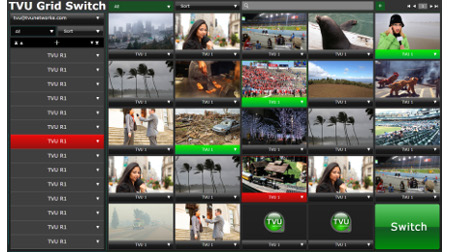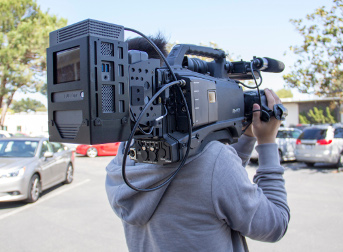Best Practices for Live Olympics Coverage over IP
The professional video industry's #1 source for news, trends and product and tech information. Sign up below.
You are now subscribed
Your newsletter sign-up was successful
RIO DE JANEIRO—As the Olympic Games continue in Rio, TV Technology recently talked with Chris Bell, vice president, customer support at TVU Networks, a Mountain View, Calif-based provider of broadcast technology about “best practices” for broadcasters using IP to provide live coverage of the games.
TV TECHNOLOGY:Tell us how TVU gear will be supporting coverage of the Summer Games in Rio.

TVU MLink
CHRIS BELL: We’re mounting a major effort to ensure our mission of “Make Every TVU Transmission Successful” is executed. The TVU equipment will be used in a variety of capacities: as roaming portable transmitters, as fixed IP encoders (TVU MLink), and feeds sent directly to TVU Grid IP-based switching networks.
For guaranteed bandwidth for our customers during the Summer Games, we laid down a MESH network on Copacabana beach in Rio. Anyone shooting with our units on cellular or Ethernet connections can be anywhere near the beach and produce mobile, live shots using the same equipment and workflow. Reporters can do their standups there with a glorious backdrop of Copacabana beach. TVU MESH is our integrated MIMO (Multiple-In, Multiple-Out) antenna technology that allows you to have your own network with dedicated WiFi/Microwave Mesh bandwidth. It combines our IP-based 3G/4G/LTE cellular broadcast with specially designed MIMO IP radio transmission technology to aggregate multiple cellular uplink and microwave MESH connections simultaneously.
We have a complimentary new package of services called “TVU@Rio” that provides customers with our TVU Anywhere app and Facebook Live integration. With TVU Anywhere, reporters can instantly capture and transmit live video footage using your phone's camera. TVU Anywhere uses the phone's cellular wireless connection and WiFi to transmit live video to a TVU Receiver or Transceiver.
Our office in Brazil will be used for fast customer support. Technical support personnel will be on-location before, during, and after the Summer Games. We are also offering several rental program packages through our Global Rental Program during the Summer Games.
The professional video industry's #1 source for news, trends and product and tech information. Sign up below.
TVT: What are the biggest challenges when using IP/bonded cellular in covering the Olympics (and similar large-scale events)?
CB: The challenges are mostly related to the sheer volume of people and density of equipment at certain events. High density events such as this and the recent political conventions stress networks to the maximum. The use of our proprietary Inverse Statmux+ (IS+) and Smart VBR make our TVU transmitters a robust ‘combat encoder’ designed to handle this stress as gracefully as possible. IS+ uses minimal data overhead without the latency introduced by packet retransmission, and Advanced Forward Error Correction technology produces superior transmission performance to typical bonded cellular approaches.
Video producers should always consider the amount of video they’re going to move and their tolerance for any kind of problem. Those solely streaming may be completely prepared with a wireless mobile transmission unit without Ethernet. But a large broadcast network may want the added security an Ethernet connection provides. Ethernet cables can be plugged directly into mobile cellular transmission units for 100 percent reliable transmission back to station receivers. Within a crowded location, if the video is mainly from one fixed place, it may be wise for a broadcaster to go with “wired” connection.
TVT:How will TVU’s gear handle the expected demand on bandwidth during the Olympics?
CB: The primary advantage TVU users get is the sheer transmission robustness of TVU technology. Combining Smart VBR and Inverse Statmux+ technology allows users to get the maximum picture quality and stability out of any environment. Our experiences from the World Cup and tests for Rio show that we can expect solid low latency transmission from most locations.
TVT:What kind of support staff will you have on hand?
CB: TVU has a rotating team of credentialed staff on hand throughout the Olympics. With access to the IBC and the Olympic park and an administrative / technology base at Copacabana beach we will be able to assist all our customers quickly and efficiently.
TVT:What are some of the other ways TVU technology (beyond just bonded cellular coverage) will be used at the games?

TVU Grid 3.0
CB: All of our North American partners will be using TVU Grid for IP distribution of content to their network or station group. The wide scale adoption of TVU Grid means we can get video into stations with no additional equipment requirements or specialist training. The feeds are always available making distribution by this mechanism a ‘no brainer’ decision.
TVT:What do you think will be the most challenging of all events to cover?
CB: Coverage on cellular of the opening and closing ceremonies usually put the highest stress on RF and bandwidth because of the large crowds, interior location and sheer spectacle of the event. In Sochi and London we were very successful, and we have expectations of another good experience in Rio.
TVT:What is the difference in regards to TVU’s technology used at Rio and the technology used at previous games, including Sochi, London, etc.?
CB: The units used for mobile new gathering at the Olympics this year will be similar to prior years. The major change is the number of broadcasters now relying on fixed TVU encoders to feed video back from the International Broadcast Center and hotels to their host entities. The encoders are being used as ‘always on’ feeds that in turn feed the corporate TVU Grids of the customers to provide content to the network or station group.
TVT:Is there a significant geographical adoption of bonded cellular technology that will be evident at the Games? (in other words, are some areas of the world more advanced in adopting this kind of technology)?

CB: The industry changes that have come about from the fast evolution and adoption of backpack technology are evident worldwide. The rapid evolution of our technology in conjunction with the rapid upgrades to the cellular networks has caused a total shift in how newsgathering is performed in only a few years. We have mobile transmitters all over the world and all of them perform well in their markets. Brazil has a well-developed LTE infrastructure which was tested during the 2014 World Cup events and has been further upgraded in the last two years.
TVT:How will TVU evaluate how the technology is performing at the games, will there be a “lessons learned” evaluation after the games?
CB: Our team on the ground will actively monitor metadata from our systems’ performance and proactively working with our customers to ensure they get the best experience. So while there will certainly be an extensive debrief, we’re not waiting until after the games to ensure our customers transmissions are successful.
Read more about how broadcasters are covering the Rio Games at our Live@TheRioOlympics social media hub.
